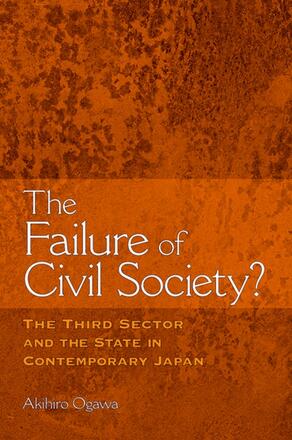
The Failure of Civil Society?
The Third Sector and the State in Contemporary Japan
Alternative formats available from:
A look at the voluntary sector in Japan, which has emerged strongly only in recent years.
Description
Winner of the 2010 Japan NPO Research Association Book Award
The global discourse on civil society is both complicated and enriched in this participant study of Japan's volunteers, known as the third sector. In the wake of the Japanese government's failed response to the 1995 earthquake, volunteers took the lead in providing aid to victims. This recent sea change in Japanese society was quickly followed by the 1998 NPO Law (nonprofit organization law) that encourages third sector activities. Drawing on his fieldwork at one of the new NPOs, Akihiro Ogawa explores in detail the social and historical particularities of Japanese "civil society" or shimin shakai, revisiting how the concept is interpreted and practiced by the volunteers themselves. Civil society, Ogawa argues, can best be understood as an active, dynamic process rather than as a static, abstract model.
Akihiro Ogawa is an Assistant Professor in the Department of Japanese Studies at Stockholm University.
Reviews
"…a welcome addition to the still scant ethnographic literature on Japan's civil sector, providing an in-depth and multi-dimensional look at the ways civil society organizations have been reimagined, mobilized and constrained by the Japanese state and by its citizens … This book is especially valuable to the growing number of practitioners in the fields of nonprofit management, voluntary action and social entrepreneurship." — Pacific Affairs
"Ogawa's excellent study is particularly valuable because of its combination of ethnographic grounding and analytical reach … His study raises important and uncomfortable questions about Japan's civil society." — Japanese Studies
"…Ogawa challenges the notion that the third sector in Japan exists independent of the state … [and] offer[s] fascinating insights into the state-civil society relations." — Social Science Japan Journal
"Ogawa writes an interesting, provocative examination of the development of civil society in contemporary Japan … This book will be of interest to students on non-Western civil society, scholars of contemporary Japan and of social entrepreneurship, and research methodologists." — CHOICE
"…Ogawa provides a fascinating account of contemporary Japanese civil society at the grass roots. His careful and illuminating ethnography of a recently incorporated nonprofit organization (NPO) reveals important insights into the changing nature of Japanese citizenship and the relationship between the nonprofit sector and the state in contemporary Japan … a valuable addition to the growing literature on civil society in Japan." — Journal of Japanese Studies
"…Ogawa's book provides a deep insight into contemporary Japan … This is an impressive study that is truly multidisciplinary in its approach and analysis." — Voluntas
"Akihiro Ogawa's book is a timely and challenging ethnography of civil society in contemporary Japan." — Asian Anthropology